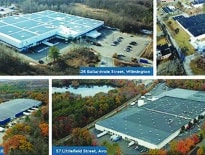
Rick Dimino
Early this year, both House Speaker Robert DeLeo and Senate President Karen Spilka invited the business community to recommend specific proposals to address the transportation crisis in Massachusetts. The debate on our statewide transportation needs and funding available has challenged policy makers and citizens for decades.
Today, the overwhelming traffic congestion on our roads, concerns about the MBTA performance and climate impacts continue to remind the public, elected officials and business leaders that we need to do more. Accelerating investments in transportation is essential to our economy and quality of life in Massachusetts. The business community is answering the call and is sending a clear message on new revenue.
This year A Better City participated in the Massachusetts Business Coalition on Transportation, a collection of 28 different organizations that planned to speak with one voice on a future transportation vision. This effort was strongly enhanced and strengthened by its statewide leadership structure. It was co-chaired by leaders of the Greater Boston Chamber of Commerce, the Cape Cod Chamber, the Worcester Regional Chamber and the Western Massachusetts Economic Development Council.
On behalf of the coalition, the Greater Boston Chamber recently announced the results of this survey and it showed “near unanimous support for additional revenue, if coupled with accountability and project delivery reforms.” Focusing on a comprehensive recommendation on new transportation revenue is the correct approach, as the era of “reform before revenue” was always a temporary position. We are now ready for revenue, with reforms and results.
Consensus Supports Statewide Fixes
Beyond the Boston area, communities across the commonwealth are suffering from crumbling roads and bridges and poor public transit options. Greater Boston’s economy is facing a triple threat – the nation’s worst traffic, unreliable transit, and acute climate impacts. We need additional revenue to keep the transportation system safe and reliable, improve access and transit to meet a growing economy and population, relieve congestion and achieve decarbonization. Another example of the need for a comprehensive transportation finance plan is the recent vote of the MBTA’s Financial and Management Control Board to transform and electrify the regional rail system. This is critically important; however, the up–to–$30 billion price tag is currently unfunded.
From the Massachusetts Business Coalition survey, we can see a consensus emerging: More revenue is needed to improve our infrastructure, but also should be designed to influence behavior with an overarching goal of getting cars off the road and increasing the use of public transit. Additionally, a coalition of nine business associations led by the Kendall Square Association recently released a multi-pronged proposal calling for the investment of new revenue to dramatically improve the commonwealth’s transportation system. Transportation for Massachusetts, a statewide advocacy organization, has also called for new revenue.
From the Massachusetts Business Coalition survey, we can see a consensus emerging: More revenue is needed to improve our infrastructure, but also should be designed to influence behavior with an overarching goal of getting cars off the road and increasing the use of public transit.
There is strong support for increasing the surcharge on Uber/Lyft rides, placing new surcharges on the wholesale price of carbon in transportation fuels through the multi-state coalition called the Transportation Climate Initiative (TCI) and moving forward on expanding roadway pricing onto certain highways in Massachusetts to achieve regional toll equity.
A majority of the group also wants to increase the gas tax independent from the TCI plan, or potentially pair the two concepts, through a higher gas tax that is reduced when TCI revenue reaches certain thresholds in a few years. The all-of-the-above approach from transportation sources of revenue is essential, as Massachusetts is facing a projected $50 billion unfunded need for transportation over the next two decades.
Businesses Deserve Applause
The urgency for a transportation solution is not just the result of the today’s challenges facing commuters, businesses and residents. The looming threats and changes posed by climate change require action. In December 2018, Gov. Charlie Baker released projections on the future through his Commission on the Future of Transportation. It pointed out impacts on climate change will require major changes in our transportation network. Recreating our transportation system to meet a legal mandate of carbon emissions must start now.
Gov. Baker’s recently proposed transportation bond bill is consistent with the position that additional transportation revenue is necessary. While many of the governor’s bond bill proposals are worth supporting, there is concern in that it proposes borrowing against future federal funds to pay for the infrastructure needs of today. Moreover, the bill is silent on how to address most of the recommendations supported by the Future of Transportation Commission, particularly with respect to decarbonization, resiliency, enhanced regional rail and electrification of our commuter rail network.
These projects are essential and must be funded in the immediate future. The governor has supported new revenue generated by the TCI program. This is a vital component to our future transportation goals, but it is only a limited compliment to other revenue increases and prices for transportation.
This work to solve transportation funding and policy needs is difficult, which underscores the courage on display by Speaker Deleo, Senate President Spilka, and many other elected officials who wrestle with the best approach for the commonwealth and their districts.
Business leaders and advocates who call for more revenue deserve praise for engaging in this effort, because there is no magic solutions free from trade-offs. Thanks to this collaboration and focus of these organizations, we are on the verge of a historic step forward to improve our transportation options in the near-term, and actually propel the commonwealth into a true 21st century economy supported by a modern, resilient, and reliable transportation system.
Rick Dimino is president and CEO of A Better City




 |
| 

